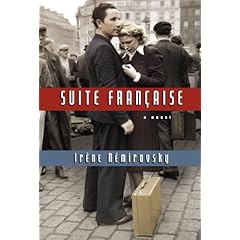Buying a Fishing Rod for My Grandfather - 3M's Review
Friday, November 30, 2007 by 1morechapter
 Buying a Fishing Rod for My Grandfather is a short story collection by Nobel laureate Gao Xingjian. It's a short book, only 125 pages, and I read it to fulfill my books in translation requirement in the Reading across Borders Challenge, my "X" author [yes, I know the Chinese last name, first name deal, but it is filed under 'X' in bookstores], and as a book that meets the requirement for the Book Awards Challenge.
Buying a Fishing Rod for My Grandfather is a short story collection by Nobel laureate Gao Xingjian. It's a short book, only 125 pages, and I read it to fulfill my books in translation requirement in the Reading across Borders Challenge, my "X" author [yes, I know the Chinese last name, first name deal, but it is filed under 'X' in bookstores], and as a book that meets the requirement for the Book Awards Challenge.There are only 6 stories in this collection, and they were picked by Gao himself to represent his writing in an English translation. In the translator's notes, she indicated that Gao "warns readers that his fiction does not set out to tell a story. There is no plot, as found in most fiction, and anything of interest to be found in it is inherent in the language itself."
Of the six stories, I found the last two, "Buying a Fishing Rod for My Grandfather" and "In an Instant" to be the most interesting. The first involves memories of childhood and the feeling that you 'can't go home again'. Here is a quote from that story:
Even so, I want to buy him a fishing rod. It's hard to explain, and I'm not going to try. It's simply something that I want to do. For me the fishing rod is my grandfather and my grandfather is the fishing rod.
The last story, "In an Instant," sort of feels like a psychedelic trip. I wasn't sure exactly what was going on in the story, but it sure was fascinating. Here is one of those 'fascinating' paragraphs:
He is sitting at the computer with a cigarette in his mouth. A long sentence appears on the screen. "What" is not to understand "what" is to understand or not is not to understand that even when "what" is understood, it is not understood, for "what" is to understand and "what" is not to understand, "what" is "what" and "is not" is "is not," and so is not to understand not wanting to understand or simply not understanding why "what" needs to be understood or whether "what" can be understood, and also it is not understood whether "what" is really not understood or that it simply hasn't been rendered so that it can be understood or is really understood but that there is a pretense not to understand or a refusal to try to understand or is pretending to want to understand yet deliberately not understanding or actually trying unsuccessfully to understand, then so what if it's not understood and if it's not understood, then why go to all this trouble of wanting to understand it--
Hmm, you tell me!
2004, 125 pp.
Rating: 4



 The Old Man and the Sea
The Old Man and the Sea )
)








 Because I read mainly novels, the identity and experience of the author is usually immaterial to me. Of course, who they are and where they are from shape their words and the stories they tell, but seldom do I pay attention to these things. My belief is that the authors would want it to be so - that they would wish for their stories and characters to stand on their own, and to be authentic without our knowing anything about the artist who brought them to life.
Because I read mainly novels, the identity and experience of the author is usually immaterial to me. Of course, who they are and where they are from shape their words and the stories they tell, but seldom do I pay attention to these things. My belief is that the authors would want it to be so - that they would wish for their stories and characters to stand on their own, and to be authentic without our knowing anything about the artist who brought them to life.
 Empire Falls
Empire Falls )
)






 The premise of this book had a lot of potential. Unfortunately, the format and perspective McEwan chose doesn't allow the characters to be fully realized. Their own personal issues and inability to examine themselves honestly leaves the reader's conception of them just as shallow as their own. In the end, this weakens the book and makes the ending seem out of place and essentially ineffective.
The premise of this book had a lot of potential. Unfortunately, the format and perspective McEwan chose doesn't allow the characters to be fully realized. Their own personal issues and inability to examine themselves honestly leaves the reader's conception of them just as shallow as their own. In the end, this weakens the book and makes the ending seem out of place and essentially ineffective. 








